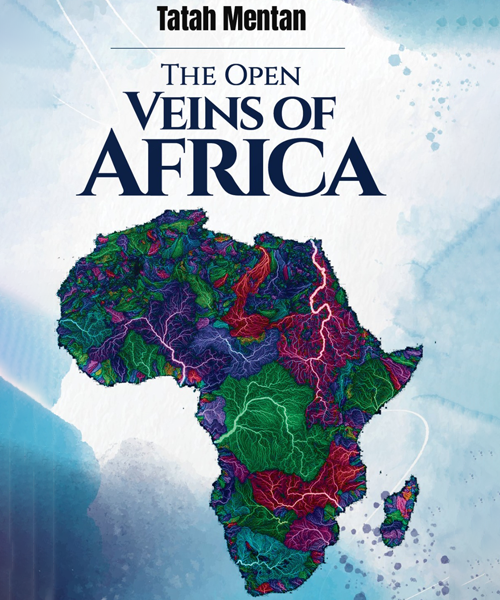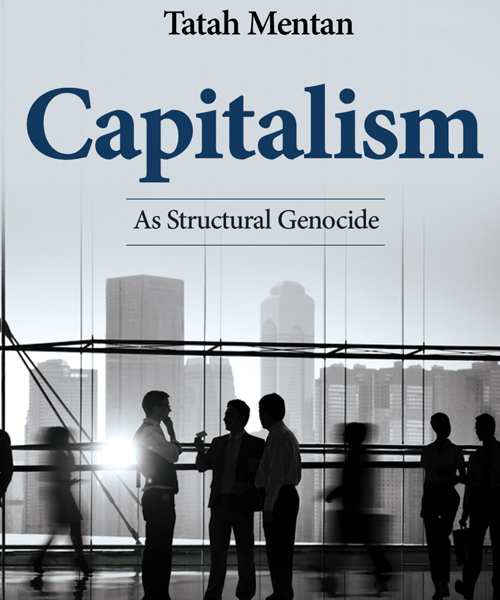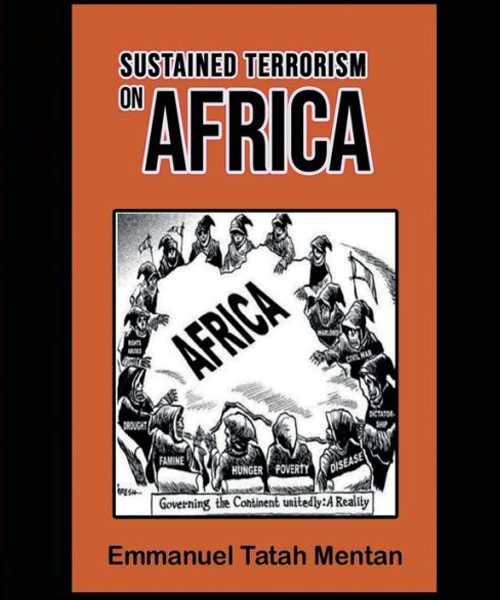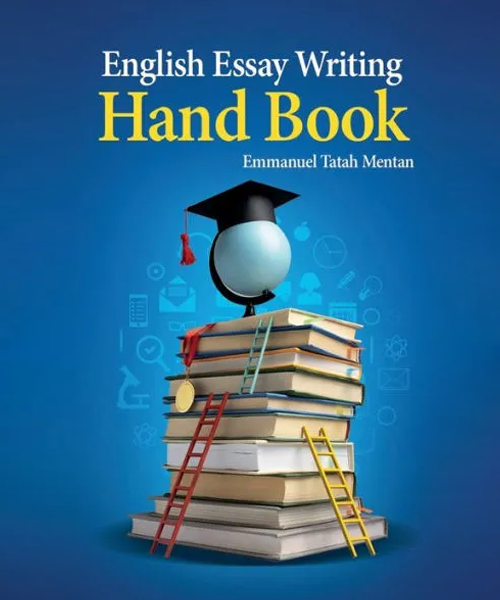FIND YOUR INSPIRATION!
GREAT STORIES FOR PERSONAL SUCCESS RESIDE HERE
About the book

The Open Veins Of Africa
There is no discussion on Africa today that does not make reference to the contradiction that exists between its wealth of natural resources and the poverty of most of its people. Africa is not a poor continent, and not all Africans are poor. Yet Africa is depicted as the world’s poorest continent, where the majority of people live with no access to clean water, decent health care, education and electricity, and struggle to survive in the face of high levels of unemployment, poverty and inequality. This is the reality we see all around the continent. The reason, according to Professor Emmanuel Tatah Mentan, is that extractive foreign industries and the competition to access natural resources envelop parasitic African governments in a web of unaccountability, corruption, repression, and rent- seeking. The love affair between many African governments and international corporations–and the optimistic power of the “Africa rising” narrative–are obscuring harsh realities, namely that many Africans are deprived of benefiting from the exploitation of their own natural resources. In many of these high growth countries, citizens now believe, that they are paying too high a price for economic growth, which does not trickle down to them. There is a new wind blowing across the continent and it is bringing with it increasing demands for Africa’s resources to benefit Africans. And past relations between extractive imperialists and puppet African governments are under scrutiny. This book dissects the dynamics of the politics of natural resource extraction in Africa that resolves into a matter of class struggle. This class struggle is visible at the level of combatting the workings of capitalism and imperialism in the interest of the dominant international class of corporatocrats and its African parasitic class, and simultaneously mobilizing forces against those exploitative and oppressive interests. Emmanuel Tatah Mentan’s book is therefore a MUST READ for students, researchers, social scientists

Capitalism As Structural Genocide
Capitalism is the framework for a market economy. However, capitalism constitutes a structural genocide through class based social systems that benefit the rich and disadvantages the poor. This book highlights these social systems and ways of leveraging opportunities for the benefit of all people.

Dilemmas of Weak States:
“Dilemmas of Weak States” explores the evolving landscape of global politics, marked by profound shifts, notably in the post-9/11 era. Within this dynamic context, the book delves into critical issues in the global political economy, with a particular focus on the pivotal relationship between terrorism and vulnerable states. Unpacking this intricate connection, especially in the African context, the text conducts an in-depth analysis of state fragility, poverty, and their role in fostering terrorism. Additionally, the book investigates the impact of radical Islam on transnational terrorism within Africa. Ultimately, it calls upon the international community to address a diverse array of challenges that contribute to the instability of African states. Discover the compelling insights within “Dilemmas of Weak States.”

English Essay Writing Handbook
Cultivate your essay-writing prowess with ‘English Essay Writing Handbook’ by the eminent Professor Emmanuel Tatah Mentan. This comprehensive guide unveils a five-step journey to essay excellence. Delve into your assignment’s depths, illuminate your understanding with background research, and sculpt a compelling thesis. Embark on a quest for knowledge, harnessing scholarly sources, meticulous note-taking, and critical reading. Craft a thesis with the precision of a skilled artisan, and outline arguments that resonate with power.
Then, embark on your essay odyssey, where you weave your thoughts and research into a seamless narrative, adorning it with properly formatted citations and references. Finally, embark on the voyage of refinement as you meticulously edit your work, ensuring your words flow with grace and style.
For writers of all levels, from novices to seasoned wordsmiths, this handbook is your trusted companion on the path to essay mastery.

Held Together by Pins
In “Held Together by Pins,” Mentan delves into the intricate dynamics of a society teetering on the edge. The much-anticipated promise of unity, progress, and stability seems to be slipping through the cracks, replaced by economic woes, political regression, and escalating tensions. As global influences and market forces exert their power, governments must grapple with financial instability and commodity volatility.
Mentan elaborates on how the correlation between political legitimacy and economic prosperity becomes a precarious balancing act, shaking the very foundations of governance. As leaders face uncontrollable external pressures, they confront a force more unyielding than traditional political opponents, steering the course away from the familiar shores of liberal democracy.
“Held Together by Pins” is a compelling read for those interested in understanding the challenges faced by societies navigating the turbulent waters of political and economic change. It offers a profound exploration of alternative democratic frameworks and the intricate political calculations that lie at their core.

Assault on Paradise
“Assault on Paradise” by Emmanuel Tatah Mentan delves into the intricate web of globalization, a term encapsulating the interplay of economic, political, and cultural forces in the world of capitalism.
While capitalism’s global presence dates back centuries, the contemporary era of globalization unfolds with the emergence of transnational institutions, shifting relations between multinational corporations and nation-states, and the rise of a uniform global consumer culture, all against the backdrop of persistent class divisions. This thought-provoking book explores the profound connections between globalization and nation-states, navigating through the dynamic, contradictory, and crisis-ridden landscape of global capitalism. Mentan also examines the ever-evolving class struggles, offering insights into the potential for societal transformation within the framework of global capitalism.
Within these pages, Emmanuel Tatah Mentan persuasively argues that modern neoliberal globalization signifies an advanced stage of capitalist hegemony. The 21st-century’s globalization paradoxes echo the inherent contradictions of capitalism on a global scale, where exploitation and militarized class conflicts could serve as catalysts for the revolutionary transformation of a vulture-like capitalist society. Mentan insists that these dominant global processes are not fixed; rather, they are subject to contestation by a variety of social class actors across three pivotal dimensions. Explore the profound impact of global capitalism in “Assault on Paradise” and contemplate its implications for the future of our interconnected world.

In Defense of Press Freedom in Africa
In ‘In Defense of Press Freedom in Africa,’ Emmanuel Tatah Mentan, a renowned authority on African politics, takes readers on an insightful journey through the intricate landscape of Africa’s quest for democracy and media freedom. In the 1960s, the birth of numerous newspapers was seen as a beacon of hope, promising a path toward true multiparty democracy. However, the reality has been a far cry from the ideal. The book explores the alarming challenges faced by journalists daring to criticize powerful incumbents in the era of multiparty politics. Media repression is on the rise, with authoritarian regimes adapting to the digital age, employing social media and sophisticated systems to tighten their grip on power.
As this gripping narrative unfolds, it becomes evident that the decline of freedom in Africa has become a disheartening trend, affecting more people in more places, subjecting them to increased repression. While high-profile cases of torture and military dictatorships have dominated headlines, a pervasive 21st-century surveillance system operates in the background, targeting political activists and undermining the principles of democracy.
“In Defense of Press Freedom in Africa” underscores the critical importance of safeguarding media freedom, not merely as a profession but as an indispensable element of the democratic way of life. Emmanuel Tatah Mentan, with unparalleled expertise, calls for unwavering support for journalists, the champions of democracy. This book serves as a powerful rallying cry, urging a collective commitment to preserving media freedom and steering Africa back on the path toward the democratic ideals that sparked its journey to independence.

Socialism
“Socialism” offers a thought-provoking exploration of the contemporary global economic landscape, dissecting the overwhelming influence of capitalism since the end of World War II. With the United States at the forefront of this capitalist force, supported by an unmatched military might, capitalism has extended its control over the world economy. The book unveils how transnational corporations have progressively tightened their hold on national governments and international institutions. Their influence has given rise to policies favoring free trade and increased privatization, which, in turn, has resulted in the accumulation of vast wealth for capital owners, often at the detriment of the environment and the working class.
This comprehensive analysis underscores how capitalism now dominates virtually every sector of the global economy, but at a profound social and environmental cost. The devastating consequences of rising inequality, extreme poverty, political instability, and the relentless march of the climate crisis—aggravated by capitalism’s aggressive production methods—threaten the well-being and future of people worldwide.
Drawing lessons from the 20th century’s tragic history, where political violence led to around 200 million deaths and widespread economic and environmental destruction, the book advocates for a 21st-century socialism that renounces violence and champions the power of non-coercive influence. In a world where capitalism exerts an imposing force, this book calls for a necessary revolution. It encourages the placement of the socialist alternative on both the national and global agendas as a means to promote a more equitable, sustainable future. “Socialism” is a compelling and timely argument for reimagining our economic and political systems in pursuit of a fairer and more environmentally conscious world.

Sustained Terrorism on Africa:
In the pages of ‘Sustained Terrorism on Africa,’ readers embark on a compelling journey through the intricate web of terrorism on the African continent. This thought-provoking work challenges conventional wisdom by shedding light on the enduring history of African suffering, from the horrors of slavery to the shackles of colonialism.
The narrative boldly underscores the urgent need for a united global response to combat this omnipresent menace, which has tormented the continent for centuries. ‘Sustained Terrorism on Africa’ calls for the dismantling of this multifaceted threat, demanding that civil liberties be safeguarded, and the voices of the vulnerable be empowered.
A gripping exploration of the past and a call to action for the future, this book offers a profound understanding of the complex terrorist landscape in Africa. It invites readers to join the quest for a shared strategy and the establishment of global networks, bridging agency, regional, and international boundaries.
In ‘Sustained Terrorism on Africa,’ the author delivers a compelling testament to the resilience of a continent facing a perennial threat, ultimately championing a united front against the forces that have wrought devastation upon its people. This is a must-read for those who seek to grasp the ongoing struggle and explore the path to a more secure and harmonious Africa.

The Elusiveness of Peace in a Suspect Global System
In the thought-provoking pages of ‘The Elusiveness of Peace in a Suspect Global System,’ Emmanuel Tatah Mentan sheds light on the myriad challenges that confront ordinary citizens in their daily lives, concealed beneath the veneer of the so-called free market. The prevailing narrative paints a picture of a utopian existence, where champions of international capitalism tirelessly strive to create a harmonious and prosperous world for all. A world seemingly untouched by ideological or economic discord, basking in 70 years of unbroken peace, where the global population enjoys the bounties of globalization.
However, this vision is but a superficial reordering of the status quo, akin to rearranging deck chairs on the Titanic. In reality, this metaphorical ‘Titanic’ represents the Global Economic & Financial System (GE&FS), ruthlessly navigating through nations, leaving a wake of human suffering orchestrated by global powerbrokers.
Within the pages of this book, Professor Emmanuel Tatah Mentan delves into the complex web of human suffering resulting from multifaceted crises encompassing terrorism, overpopulation, the denial of basic human rights, economic disparities, racial biases, extremist ideologies, religious intolerance, social injustices, environmental imbalances, unchecked consumerism, and the oppression of the vulnerable. With unwavering conviction, he advocates for a transformative global ethics, one that demands a collective acknowledgment of our roles and responsibilities in safeguarding global peace. This entails a reimagining of the responsibilities of educators, the moral obligations of scientists, philosophers, and thinkers, and the cultivation of core human values, including nonviolence and love. ‘The Elusiveness of Peace in a Suspect Global System’ is a call to action and a beacon of hope in an increasingly complex world.

The New World Order Ideology and Africa
Delve into the intricate web of ‘The New World Order Ideology and Africa,’ a thought-provoking book authored by the insightful Emmanuel Tatah Mentan. In this eye-opening exploration, Mentan sheds light on the pervasive influence of the New World Order ideology, channeled through the lens of neoliberal globalization. This ideology, embraced by politicians, scholars, and media figures across generations, is revealed as a global conspiracy, seeking to assert complete dominion over our planet through financial manipulation.
With a focus on the African continent, Mentan uncovers a stark reality where the continent’s nations become pawns in a game that disregards fundamental principles like human rights, improved living standards, and democratization. This ideology aims to advance the agenda of those who seek to establish governance through financial operations, with dire consequences for Africa.
Mentan skillfully dissects the strategy employed by these money farmers, drawing parallels with credit card companies. They lend as much as the subject can bear, while still meeting the demands of fees, charges, and interest. This tactic perpetuates a cycle of borrowing, debt consolidation, and continuous lending, even at the risk of depleting foreign exchange reserves.
The book argues that the lending agencies’ ideal scenario is to push African countries to the brink of full dependence on loans for governing and sustaining the nation. Once this precarious balance is reached, a never-ending stream of foreign exchange is harvested from the helpless and despondent African governments and people.
‘The New World Order Ideology and Africa’ is a compelling, meticulously researched work that unveils the hidden forces at play in the global arena, offering an in-depth understanding of their impact on the African continent. Emmanuel Tatah Mentan’s incisive analysis challenges prevailing narratives and invites readers to reevaluate their perception of global politics and finance. This book is an essential read for anyone seeking to comprehend the complex dynamics shaping our world today.

The Recolonization of Africa Today
Discover the pressing need for a reevaluation of Africa’s destiny in ‘The Recolonization of Africa Today.’ In this insightful book, Professor Mentan sheds light on the dramatic shift in the political, economic, and social landscape of sub-Saharan Africa, driven by the expanding influence of China, the southward ambitions of Maghreb states and Egypt, and their pursuit of Islamization, Arab investments, and control of vital resources.
Mentan provides a lucid analysis of the roots of neocolonialism, questioning the alleged benevolence of global powers. In three new chapters, he delves into the impact of non-governmental organizations (NGOs) on African communities, resembling the transformation witnessed in Haiti.
The book also scrutinizes African higher education, which often mimics Western models incompatible with the realities of Highly Indebted Poor Countries (HIPC) in West and Central Africa. ‘Academic capitalism’ is exposed as a harmful force, particularly affecting the most vulnerable societies and nurturing Fundamentalist Islam and Christianity.
Mentan’s critical lens doesn’t spare national and local elites and homegrown actors, attributing their role in current events. He asserts that the forces of neocolonialism, though disavowing the label, persist in their quest to exploit Africa’s vast natural resources and burgeoning consumer demand.
‘The Recolonization of Africa Today’ also confronts the harsh truths of genocide, unending conflict, disease, and forced urbanization, with a focus on Darfur, Southern Sudan, Eastern Congo, Rwanda, and Cote d’Ivoire. Prepare for an eye-opening exploration of the continent’s present challenges and the forces reshaping its future.

Sustained Terrorism on Africa: A Study of Slave-ism, Colonialism, Neocolonialism, and Globalism
Human beings indeed need not justify terrorism of any kind, regardless of whether one is Muslim, Christian or Jew, because it is the axis of evil and devastation of mankind. Terrorism on Africa has been a ubiquitous presence against which the democratic values of African civilization are ranged-a demon to be exorcised at all costs, even at the cost of civil liberties. However, the deliberate use of the term terrorism in recent decades was carefully selected, mainly, against a certain religion (Islam). The idea was then globally politicized by the Western world. Leaving that scholarly view in its own right, this study disagrees with the opinion raising terrorism as the devil’s just-born child of evil, when in reality Africans had been terrorized for centuries as slaves and human chattel, colonies, neo-colonies and captives of globalism.
Terrorism on Africa has been the global threat against which global war must now be fought. It should have never taken place anyway! Whether the terrorizing country was peaceful or violent, no country should be granted the right to seize and restrict the development of a region. Europeans have crippled the rich native African civilizations for their own political and economic gain for centuries. No matter the reason, no intelligence, knowledge, or technology permits one country or countries to terrorize another or other countries like the terrorized and victimized in Africa.
Africans must disable and counter propaganda and information operations. We must address known causal factors by strengthening vulnerable populations and improving their ability to identify, characterize, attribute, and defend against terror networks and threats. Our counter-terrorism architectures and capabilities will need to be more agile and more integrated. Mankind needs a common strategy.

ENGLISH ESSAY WRITING HANDBOOK
This English Essay Writing Handbook by Professor Emmanuel Tatah Mentan presents tips, methods, and strategies for writing excellent essays with a 5 step process: Develop a topic by understanding the assignment requirements, exploring background information, and forming a working thesis; Conduct research using scholarly sources, taking critical notes and reading closely; Create a thesis statement and outline of arguments that will form the essay; Write the essay and integrate research evidence with properly formatted citations and references; and, Edit, review and revise your thesis, outline, and writing for grammatical errors and common structural and stylistic mistakes. It is hoped that this English Essay Writing Handbook will be an invaluable companion to students at all levels.